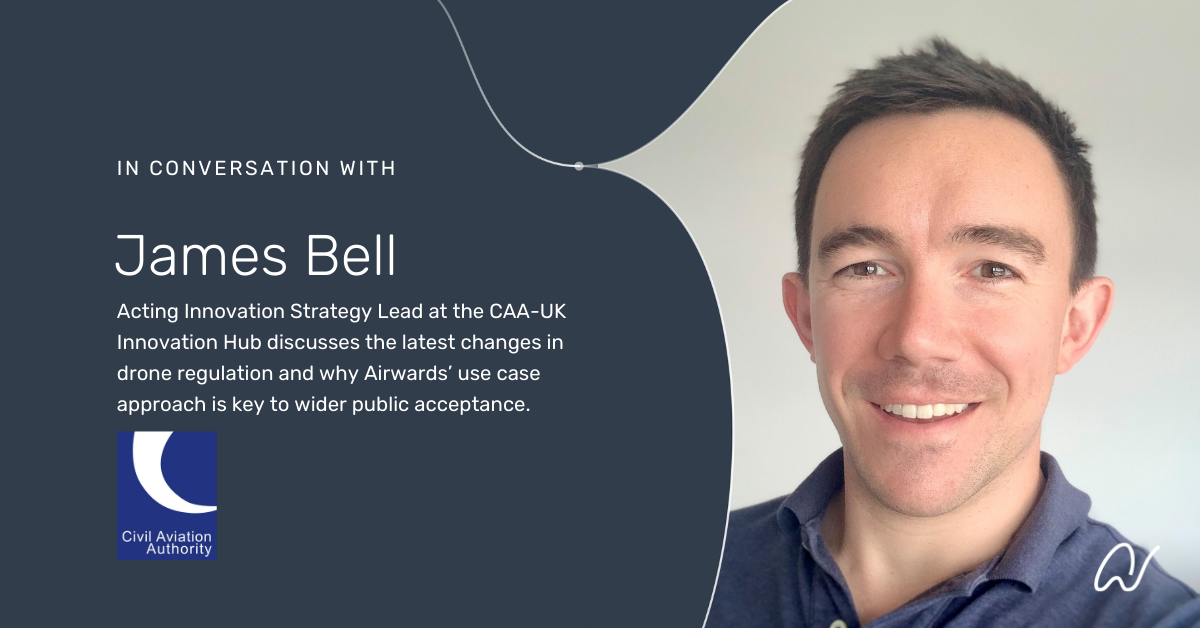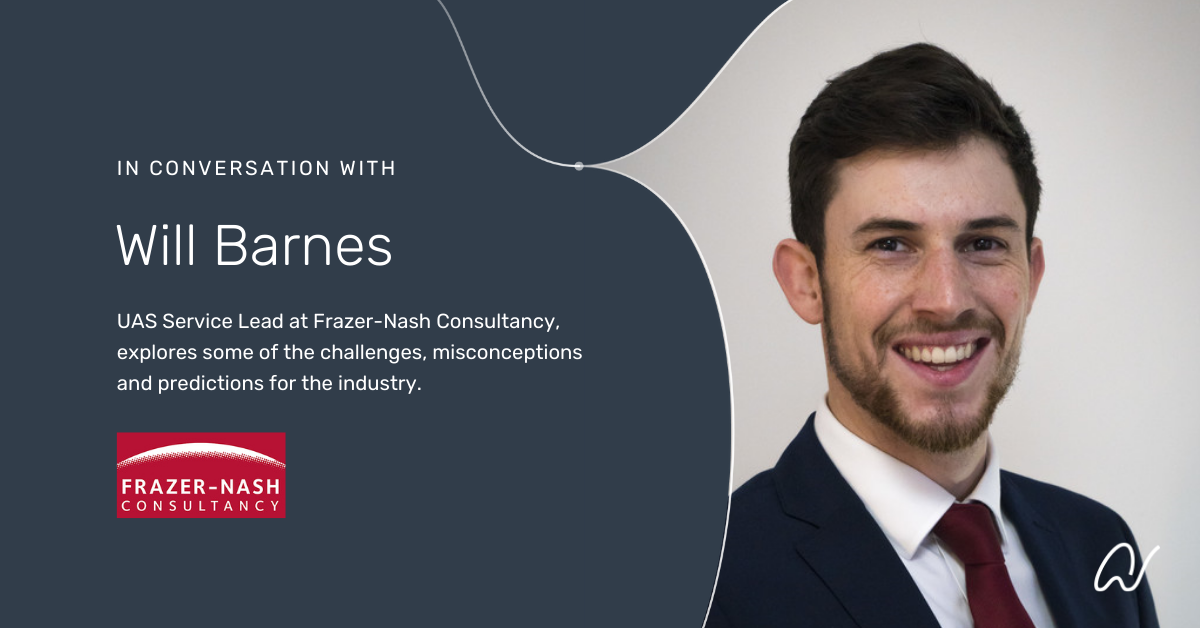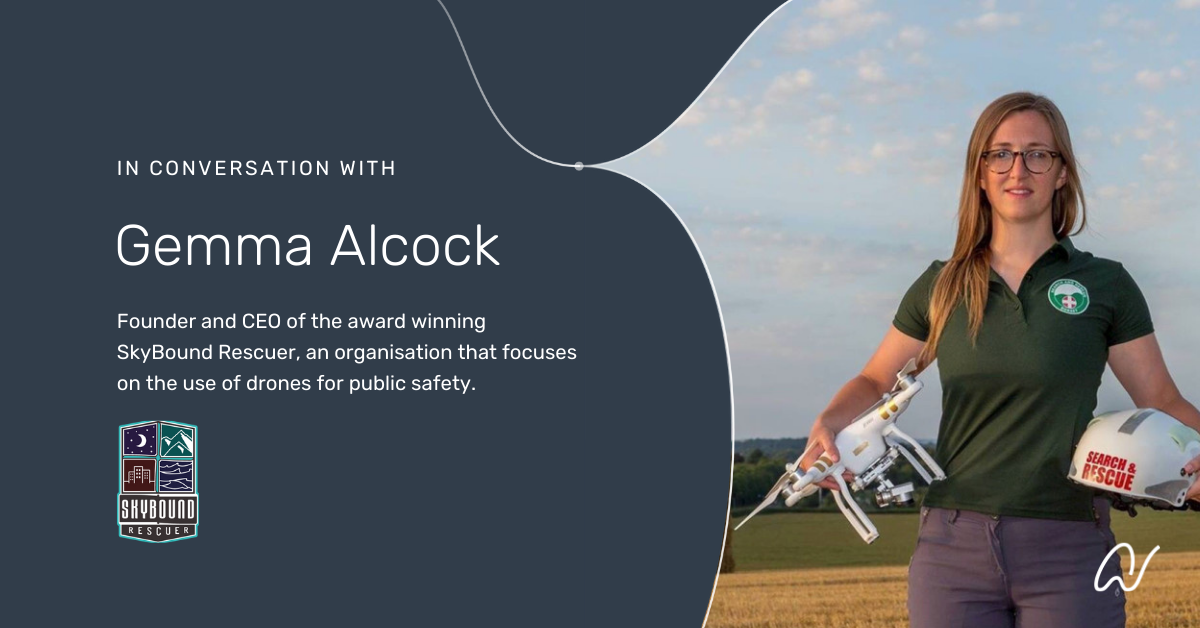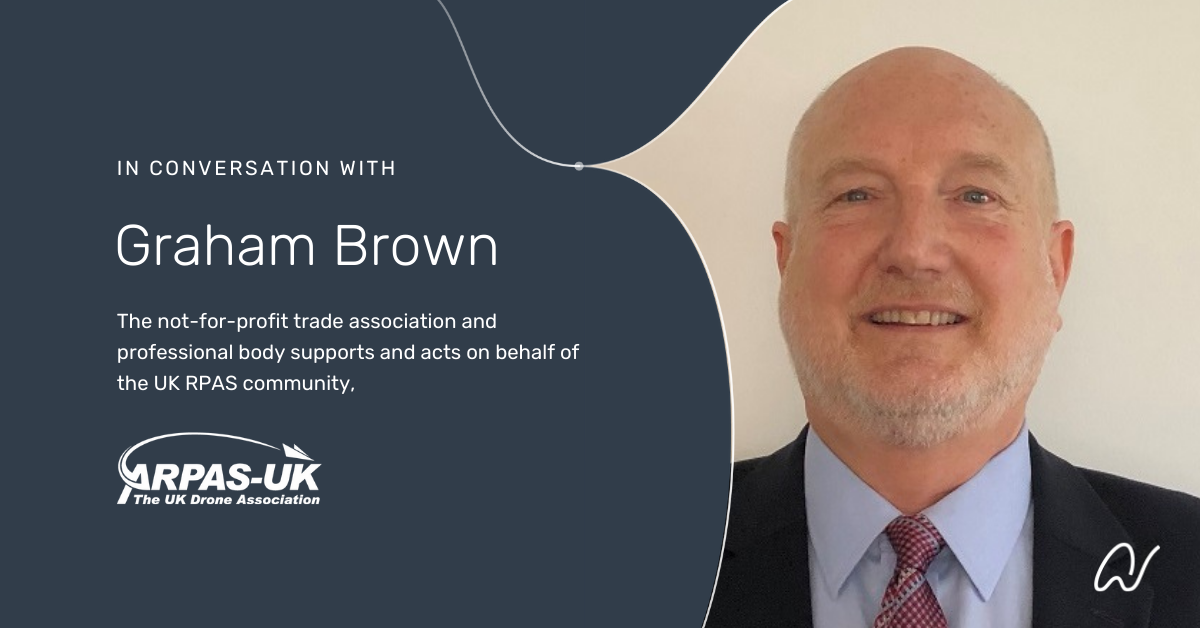In Conversation With
Each week, Airwards chats to someone in the drone industry doing incredible work. We uncover what they do, what makes them tick, where they see the drone industry headed, and discuss positive drone use.
In our latest blog instalment, we speak to Will Barnes, UAS Service Lead at Frazer-Nash Consultancy, a leading systems and engineering technology company. Will shares his journey in coming to specialise in drones and explores some of the challenges, misconceptions and predictions for the industry.
Will leads Frazer-Nash’s Unmanned Aerial Systems (UAS) business, supporting organisations across a breadth of industries to adopt and develop drone technology in a way that enhances their performance and safety. Airwards is proud to have Frazer-Nash on board as an advisor and partner.
1 | How did you get into UAS?
I’ve always been fascinated by new and emerging tech, and this invariably led me to drones. My original interest with drones stemmed from the photography side, but this has evolved alongside my career. At university I led a team to develop a fixed-wing drone and I was also an RAF Officer Cadet. Whilst at university, I worked for the helicopter design and manufacturing company, AgustaWestland (now Leonardo), as well as Frazer-Nash in 2014, before joining Fazer-Nash full time. Since then, I’ve been able to combine a passion for drones and emerging technologies with expertise in systems engineering and aviation safety management to make a difference in the world.
2 | What is your role and how do Frazer-Nash work with drones?
I work with a variety of organisations at Frazer-Nash, like National Grid, Highways England and the Ministry of Defence, helping them to make the most of drones - in simplest terms. We help clients understand drone technology and how it can be used, before developing and trialling new drone capabilities, like BVLOS and autonomy. Importantly, I often analyse whether there’s a strong technical and commercial case for using drones, as it’s important to recognise that they are not always the solution!
Our vision is to make drones commonplace in a way that benefits society. To get there, an industry-wide challenge is ‘Beyond Visual Line of Sight’. BVLOS is a term relating to the operation of drones at distances outside the normal visible range of the pilot. BLVOS flight and autonomous drone operation are important concepts for the growth of the commercial drone market. But the industry has a way to go in overcoming these challenges.
3 | What’s the most exciting project you’ve worked on?
I’m currently working with the National Grid on a pioneering example of drone use. We’re working to improve UK national infrastructure by boosting the National Grid’s safety and effectiveness, whilst reducing the cost to maintain assets. Crucially, using Frazer-Nash experts, we’re developing safety arguments to progress the understanding of BVLOS. Once we can demonstrate that certain types of BVLOS activity can be done safely, we’ll unlock a wider range of use cases for drones and significantly improve the benefits they provide.
4 | What’s the biggest UAS misconception you’d like to see debunked?
Types of drones vary tremendously, in terms of size, shape and use. However, many people place them in one category and view all drones as flying cameras. It’s true that the majority of UAS are in the sky because of the data they capture. But their range of capabilities scale far beyond that of a standard camera.
For instance, there are ground-penetrating radar that can provide a sub-surface imagery to reduce the cost of asset inspection dramatically. Deliveries are becoming more and more commonplace and we’re seeing an increase in aerial repair use cases. Take a look at the University of Leeds using drones to repair roads with 3D printing. In addition, Imperial College London using dart-firing drones to distribute environmental sensors. These are just two examples of the incredible benefits UAS can provide – they are certainly more than the flying cameras.
5 | How has the drone industry changed over the past few years?
I recently explored this at the Commercial UAV Show 2020. If we stop and look back, drone operation historically consisted of a single pilot operating with basic automated system features. This has typically been a small to medium-sized quadcopter, operating within the line of sight. This is changing now as we see more BVLOS trials, alongside an increase in levels of autonomy. And this is true not just for more intelligent drone navigation, but also data processing, using Machine Learning to automate recognition of features such as cracks in structures or vegetation growing over assets.
Moreover, drones have been perceived as innovation projects. It’s this view that has started to change more recently. That is to say, there’s been a shift from drones as innovation projects to becoming part of business as usual – though we still have a long way to go. As we move closer to BVLOS, the benefits drones provide will only increase as companies recognise the true extent of their capabilities. Who wouldn’t want to reduce pilot fatigue and augment pilot abilities, with one pilot managing multiple systems at once?
6 | Why are you involved with Airwards and what do you think of the awards scheme?
I worked with Airwards founder, Richard Nichols, 10 years ago at AgustaWestland (now Leonardo). I think what Airwards has set out to do - highlighting successes in the drone industry - is fantastic, and really needed. Ultimately, drones are just a tool. The real beauty lies in the benefits they deliver: solving real-world problems.
The awards criteria - ‘Innovative, Responsible and Real-world’ - closely align with Frazer-Nash’s values and vision. I’m personally passionate about using innovative new ideas but it’s also critical to do things safely - particularly with aviation. I look forward to seeing entrants that demonstrate positive, innovative and safe uses of drones, and collaborate with them to raise public awareness of all the benefits drones are delivering to society. This is something I feel is vital to the success of the industry.
About Will
Will leads the drone business within Frazer-Nash Consultancy. He's a Chartered, Mechanical Engineer and draws on his systems engineering and aviation safety background to help organisations adopt and make the most of drones. This includes national infrastructure, the emergency services, the UK government and the Ministry of Defence.
Connect with Will on LinkedIn and visit Frazer-Nash Consultancy for more information.















